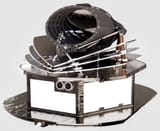Search Results
7/5/2025, 12:41:11 PM
>>16716412
>On a sidenote is the jwst the peak a telescope can get because it sees infrared?
No. Firstly you can always build a bigger telescope. The infrared can be powerful, but it doesn't tell you everything. What you mean by peak depends on what you want to study. If the answer is exoplanets, then no, it's not the peak.
JWST is in high demand, and transit spectroscopy takes a lot of interruptions of other programs. So ultimately JWST won't study that many planets in detail. ESA is building a mission called ARIEL, which covers the same broad wavelength range, but it can observe the whole range at once (JWST cannot). And it was designed exclusively for transit spectroscopy, even though it is smaller than JWST it may reach deeper because lower systematics. It will study the atmospheres of around 1000 exoplanets, or various types. Many of those planets will be selected from ESA's other mission, PLATO. PLATO is a transit survey like Kepler and TESS, but more optimized to find earth like planets that can be followed up. ARIEL will launch in 2029, PLATO in 2026.
>On a sidenote is the jwst the peak a telescope can get because it sees infrared?
No. Firstly you can always build a bigger telescope. The infrared can be powerful, but it doesn't tell you everything. What you mean by peak depends on what you want to study. If the answer is exoplanets, then no, it's not the peak.
JWST is in high demand, and transit spectroscopy takes a lot of interruptions of other programs. So ultimately JWST won't study that many planets in detail. ESA is building a mission called ARIEL, which covers the same broad wavelength range, but it can observe the whole range at once (JWST cannot). And it was designed exclusively for transit spectroscopy, even though it is smaller than JWST it may reach deeper because lower systematics. It will study the atmospheres of around 1000 exoplanets, or various types. Many of those planets will be selected from ESA's other mission, PLATO. PLATO is a transit survey like Kepler and TESS, but more optimized to find earth like planets that can be followed up. ARIEL will launch in 2029, PLATO in 2026.
Page 1
